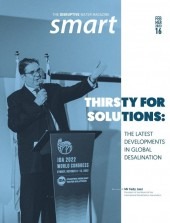If we all agree that water is critical for life, growth, and prosperity, then we need a new approach to ensure enough water for all (people, planet, and profit). Climate change, natural disasters, population growth, urbanisation, and human-driven events like pandemics, war, and social instability have accelerated the water crisis. A crisis underpinned by poor water management, inadequate and outdated infrastructure, insufficient investments, and struggling water utilities. This has resulted in inefficient water services across many cities worldwide, albeit to varying degrees.
The water crisis is no longer “looming” — it is here. According to UNICEF, four billion people — almost two-thirds of the world’s population — experience severe water scarcity over certain periods. The factors driving water scarcity are undoubtedly many and complex; however, bolder, more urgent action is needed to introduce and scale what works well, reduce or eliminate what doesn’t, and pursue new and more innovative solutions. One such solution is digitalisation.
The why, what, and how of water digitalisation
We already know why we’re doing this: We need water to survive. We already know how to do this: we have the technologies and digital solutions, access to a global knowledge pool, and the ever-increasing availability of vast amounts of data and data processing capacity. And we know what we need to do.
There are many examples and experiences to draw from, including: predictive software adoption to automate and control water systems across the Netherlands; real-time incident reporting and handling digital systems in Uganda; smart asset management systems for improved operations and maintenance of water infrastructure in Brazil; wastewater network optimisation tooling to avoid flooding in the USA, to name a few.
We need to act – we cannot rely on what worked in the past when dealing with radical changes in the world and an uncertain future
Now, we need to act. It starts with a shift in mindset and an acceptance that the “business as usual” approach to water management is no longer adequate or acceptable. We cannot rely on what worked in the past when dealing with radical changes in the world and an uncertain future.
So, what do we need to do?
In my view, there are three things we need to start doing. First, we need to start thinking differently about how we preserve, use, and reuse water. We need to better align on issues and priorities and adopt a broader national and global agenda – from policies to planning to budgeting. Second, we need to share our collective experiences, best practices, and expertise, especially around digital solutions. Finally, we need to engage all because the water crisis impacts all: the public sector, which is often tasked with water management; the private sector, which commands extensive resources and can foster and drive digitalisation at a much faster pace; academia and research institutions, which bring a wealth of knowledge and are a prime source of innovation and invention, and civil society, which has a vested interest in the sector's success.
Unlocking a new era of water abundance
Digital technologies and solutions such as digital twins, IoT (Internet of Things), AI (Artificial Intelligence), and BIM (Better Information Management) offer unlimited potential to transform the water sector for the better. The benefits are numerous, and the value undeniable, namely: enhanced operational efficiency and optimisation resulting in increased affordability, greater transparency, enhanced social and economic (water) security and resilience, and improved environmental protection and sustainability,
The digitalisation of the water sector is by no means a quick, all-encompassing fix to the water crisis. Although there can be almost immediate impacts, the true, long-lasting results/ benefits will take a while to realise. But they will become apparent in the form of cost savings, resource optimisation, and healthier systems, cities, and societies.




